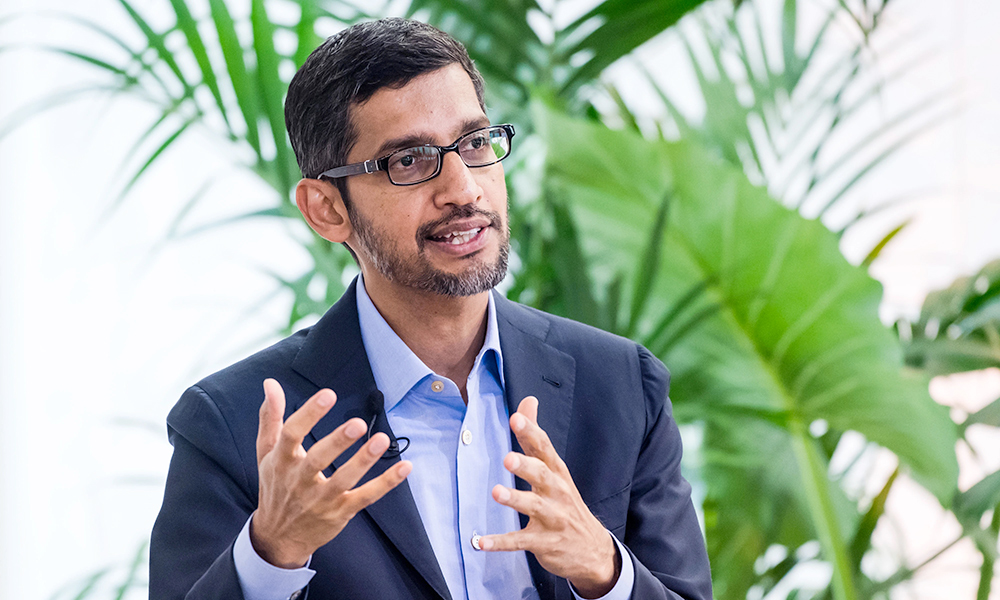
谷歌(Google)搜索引擎,、谷歌地圖(Google Maps)以及語音激活的谷歌助手(Google Assistant)即將迎來重磅更新,。
谷歌周三在年度谷歌I/O開發(fā)者大會上宣布了更新的消息。由于新冠疫情,,今年的大會改為在線上召開,。
谷歌高級副總裁普拉巴卡·拉加萬對《財富》雜志表示,更新旨在幫助公司緊跟用戶習(xí)慣的變化,,使搜索變得更直觀,、更簡單。他說道,,兒童,、青少年和首次使用網(wǎng)絡(luò)的其他群體,不一定知道要在搜索框中輸入兩個關(guān)鍵詞,,因此“我們不能還用20年前的方式滿足用戶的搜索需求,。”
以下是此次更新的三大看點:
搜索將變得更直觀,、更本地化
從今年晚些時候開始,,人們可以使用智能手機攝像頭,在谷歌的核心搜索功能中輸入更復(fù)雜的問題,。通過這項新功能,,用戶可以拍攝服裝,、食品和家電等商品的照片或者在線截屏,然后檢索附近出售這些商品的餐廳和商店列表,。
谷歌最早通過其谷歌智能鏡頭(Google Lens)產(chǎn)品推出了一項類似功能,。但拉加萬稱當(dāng)時只是一次試驗;現(xiàn)在智能鏡頭技術(shù)已經(jīng)足夠成熟,,可以合并到谷歌的核心搜索功能當(dāng)中,。
拉加萬表示:“現(xiàn)在我們認(rèn)為它已經(jīng)足夠好,因此每一個搜索欄,,無論是在iPhone還是安卓手機上,除了有關(guān)鍵詞欄,,還會有攝像頭和話筒,。”
谷歌還宣布正在開發(fā)一項名為“場景探索”的新功能,,目前未確定該功能的發(fā)布日期,。該項功能將幫助用戶更快檢索通過智能手機鏡頭看到的物品的信息。谷歌表示,,例如,,新功能的用戶可以掃描整個商店,然后檢索每一件商品的詳細(xì)信息,,而不是每次只能搜索一件商品,。
在谷歌地圖里走進餐廳
谷歌地圖將推出一項名為“沉浸式視圖”的功能,可幫助用戶以3D視角參觀舊金山和洛杉磯等城市的商店,、標(biāo)志性建筑和景點等,。與傳統(tǒng)的3D地圖視圖不同,沉浸式視圖細(xì)節(jié)更豐富,,將使用無人機拍攝的航空圖像,、衛(wèi)星圖像和地面視覺效果。在大會之前的功能演示中,,谷歌高管展示了用戶如何通過這項新功能,,以虛擬的方式走進商店,例如咖啡廳,,人們可以先查看內(nèi)部的環(huán)境再決定是否要實際前往店鋪消費,。
用戶還可以查看倫敦大本鐘等全球知名景點在每天不同時間和不同天氣狀況下的狀態(tài)。
沉浸式視圖功能將在今年晚些時候上線,,覆蓋洛杉磯,、舊金山、倫敦,、紐約和東京等城市,。
與人工智能助手交流變得更自然
與亞馬遜(Amazon)等競爭對手一樣,谷歌正在努力使與語音激活的谷歌助手的互動變得更加自然,就像是與真人交流,,而不是經(jīng)常錯誤理解用戶指令的聊天機器人,。
通過該公司的“Look and Talk”功能,Nest Hub Max智能家居顯示屏的用戶只需要看一眼設(shè)備的數(shù)字屏幕然后問一個問題就能激活谷歌助手,,不需要說“嘿,,谷歌”來激活。谷歌高管表示,,用戶需要同意設(shè)備分析其語音和面部才能使用該功能,。拉加萬表示:“并不是隨便某個人都能走進你的房間,激活助手打開燈或其他家電,?!?/p>
Nest Hub Max用戶可以命令谷歌助手關(guān)閉家中聯(lián)網(wǎng)的燈或者設(shè)定定時關(guān)閉,不需要喊“嘿,,谷歌”來激活這個動作,。這項功能的目的是減少人們說“嘿,谷歌”的次數(shù),,因為這讓人覺得很討厭,。
最后,谷歌計劃更新谷歌助手,,使軟件在人們自然地與其對話時不會出現(xiàn)停頓,,比如長時間暫停或者說“嗯”等,。(財富中文網(wǎng))
譯者:劉進龍
審校:汪皓
Alphabet對谷歌搜索,、谷歌地圖和人工智能助手的更新有哪些看點? GEERT VANDEN WIJNGAERT —— 彭博社/蓋蒂圖片社
谷歌(Google)搜索引擎,、谷歌地圖(Google Maps)以及語音激活的谷歌助手(Google Assistant)即將迎來重磅更新,。
谷歌周三在年度谷歌I/O開發(fā)者大會上宣布了更新的消息。由于新冠疫情,,今年的大會改為在線上召開,。
谷歌高級副總裁普拉巴卡·拉加萬對《財富》雜志表示,更新旨在幫助公司緊跟用戶習(xí)慣的變化,,使搜索變得更直觀,、更簡單。他說道,,兒童,、青少年和首次使用網(wǎng)絡(luò)的其他群體,不一定知道要在搜索框中輸入兩個關(guān)鍵詞,,因此“我們不能還用20年前的方式滿足用戶的搜索需求,?!?/p>
以下是此次更新的三大看點:
搜索將變得更直觀、更本地化
從今年晚些時候開始,,人們可以使用智能手機攝像頭,,在谷歌的核心搜索功能中輸入更復(fù)雜的問題。通過這項新功能,,用戶可以拍攝服裝,、食品和家電等商品的照片或者在線截屏,然后檢索附近出售這些商品的餐廳和商店列表,。
谷歌最早通過其谷歌智能鏡頭(Google Lens)產(chǎn)品推出了一項類似功能,。但拉加萬稱當(dāng)時只是一次試驗;現(xiàn)在智能鏡頭技術(shù)已經(jīng)足夠成熟,,可以合并到谷歌的核心搜索功能當(dāng)中,。
拉加萬表示:“現(xiàn)在我們認(rèn)為它已經(jīng)足夠好,因此每一個搜索欄,,無論是在iPhone還是安卓手機上,除了有關(guān)鍵詞欄,,還會有攝像頭和話筒,。”
谷歌還宣布正在開發(fā)一項名為“場景探索”的新功能,,目前未確定該功能的發(fā)布日期,。該項功能將幫助用戶更快檢索通過智能手機鏡頭看到的物品的信息。谷歌表示,,例如,,新功能的用戶可以掃描整個商店,然后檢索每一件商品的詳細(xì)信息,,而不是每次只能搜索一件商品,。
在谷歌地圖里走進餐廳
谷歌地圖將推出一項名為“沉浸式視圖”的功能,可幫助用戶以3D視角參觀舊金山和洛杉磯等城市的商店,、標(biāo)志性建筑和景點等,。與傳統(tǒng)的3D地圖視圖不同,沉浸式視圖細(xì)節(jié)更豐富,,將使用無人機拍攝的航空圖像,、衛(wèi)星圖像和地面視覺效果。在大會之前的功能演示中,,谷歌高管展示了用戶如何通過這項新功能,,以虛擬的方式走進商店,例如咖啡廳,,人們可以先查看內(nèi)部的環(huán)境再決定是否要實際前往店鋪消費,。
用戶還可以查看倫敦大本鐘等全球知名景點在每天不同時間和不同天氣狀況下的狀態(tài),。
沉浸式視圖功能將在今年晚些時候上線,覆蓋洛杉磯,、舊金山,、倫敦、紐約和東京等城市,。
與人工智能助手交流變得更自然
與亞馬遜(Amazon)等競爭對手一樣,,谷歌正在努力使與語音激活的谷歌助手的互動變得更加自然,就像是與真人交流,,而不是經(jīng)常錯誤理解用戶指令的聊天機器人,。
通過該公司的“Look and Talk”功能,Nest Hub Max智能家居顯示屏的用戶只需要看一眼設(shè)備的數(shù)字屏幕然后問一個問題就能激活谷歌助手,,不需要說“嘿,,谷歌”來激活。谷歌高管表示,,用戶需要同意設(shè)備分析其語音和面部才能使用該功能,。拉加萬表示:“并不是隨便某個人都能走進你的房間,激活助手打開燈或其他家電,?!?/p>
Nest Hub Max用戶可以命令谷歌助手關(guān)閉家中聯(lián)網(wǎng)的燈或者設(shè)定定時關(guān)閉,不需要喊“嘿,,谷歌”來激活這個動作,。這項功能的目的是減少人們說“嘿,谷歌”的次數(shù),,因為這讓人覺得很討厭,。
最后,谷歌計劃更新谷歌助手,,使軟件在人們自然地與其對話時不會出現(xiàn)停頓,,比如長時間暫停或者說“嗯”等,。(財富中文網(wǎng))
譯者:劉進龍
審校:汪皓
Google's search engine as well as Google Maps and voice-activated Google Assistant are getting major upgrades.
Google announced the updates Wednesday during its annual Google I/O developer conference, held virtually this year due to the COVID-19 pandemic.
The tweaks are intended to help keep up with changing user habits and make searching more intuitive and easier, Google senior vice president Prabhakar Raghavan told Fortune. Children, young adults, and others coming online now for the first time don't necessarily know to type in two keywords in the search box, he said, and that therefore “We cannot be serving the same queries and the same needs we did 20 years ago.”
Here’s three takeaways from Google's announcements:
Search will be more visual and local
People will be able to enter more complicated queries into Google's core search using their smartphone cameras sometime later this year. With the new feature, people will be able to take photos or capture screenshots online of goods like clothing, food, and home appliances, and retrieve a list of all the nearby restaurants and stores that sell those items.
Google had debuted a similar function via its Google Lens product. But Raghavan characterized that as experimental; the Lens technology is now good enough to be incorporated into Google's core search.
“Now we feel good enough about it so that every search bar, whether your iPhone or Android, has of course a keyword bar, but also a camera and a microphone,” Raghavan said.
Google also said it is developing a new feature, which does not have a release date, called “scene exploration” that will let people more quickly retrieve information about objects they view through their smartphone cameras. The company said that users of the new feature will be able to scan an entire store shelf, for instance, and retrieve details about every item rather than having to focus on just one item at a time.
Now you can go inside restaurants using Google Maps
Google Maps is getting a feature called “immersive view” that will let people visit stores and iconic buildings and attractions in cities like San Francisco and Los Angeles in 3D. Unlike Google’s traditional 3D map view, immersive view is much more detailed, and uses a combination of aerial imagery captured by drone, satellite imagery, and on-the-ground visuals. In a demonstration prior to the conference, executives showed how the new feature will let users virtually enter certain stores like cafes so they can inspect the interiors before they decide they want to visit in real life.
People will also be able to see what popular world attractions like London's Big Ben look like at different times of the day and in different weather conditions.
The immersive view feature will debut later this year for a few cities including Los Angeles, San Francisco, London, New York City, and Tokyo.
Talking to an A.I. assistant should become more natural
Similar to competitors like Amazon, Google is trying to make interacting with its voice-activated Google Assistant more of a natural experience akin to conversing with an actual human rather than a chatbot that frequently misunderstands what people tell it.
The company’s “Look and Talk” feature will let customers of Google’s Nest Hub Max smarthome display activate Google Assistant by merely looking at the device’s digital screen and then asking a question, so they don’t have to activate the assistant by saying “Hey Google.” Google executives said that the feature only works for people who have consented to have their voices and faces analyzed by the device “so some random person cannot walk into your house and turn on the lights or whatever,” Raghavan said.
Nest Hub Max users will also be able to command Google Assistant to turn off Internet-connected home lights or set timers without having to say “Hey Google” to initiate the action. The goal is to reduce the number of times people need to say, “Hey Google,” which can be annoying.
Eventually, Google plans to update its Google Assistant so that the software doesn’t stumble when people talk naturally to it, such as when they take long pauses or utter “ums.”






